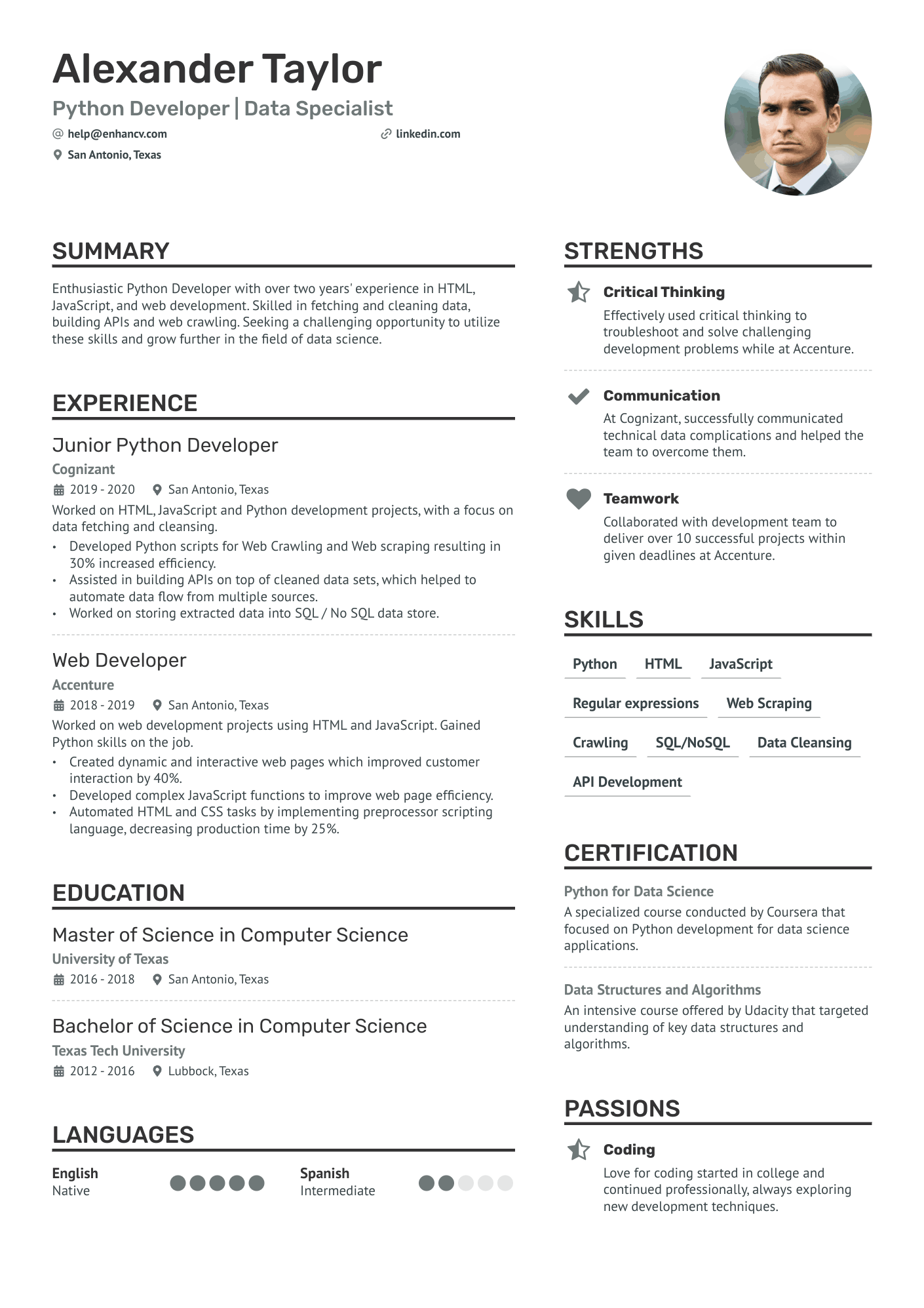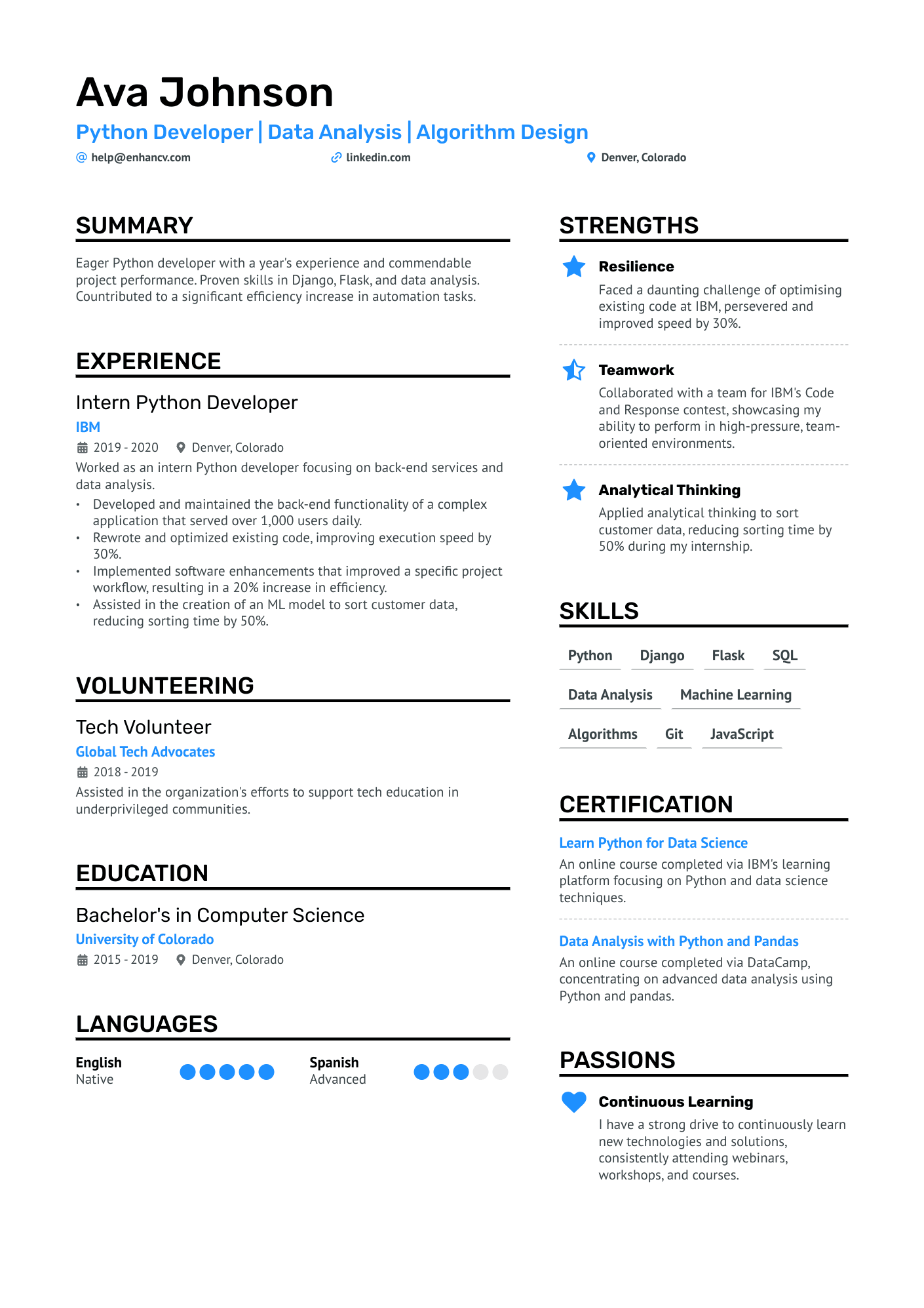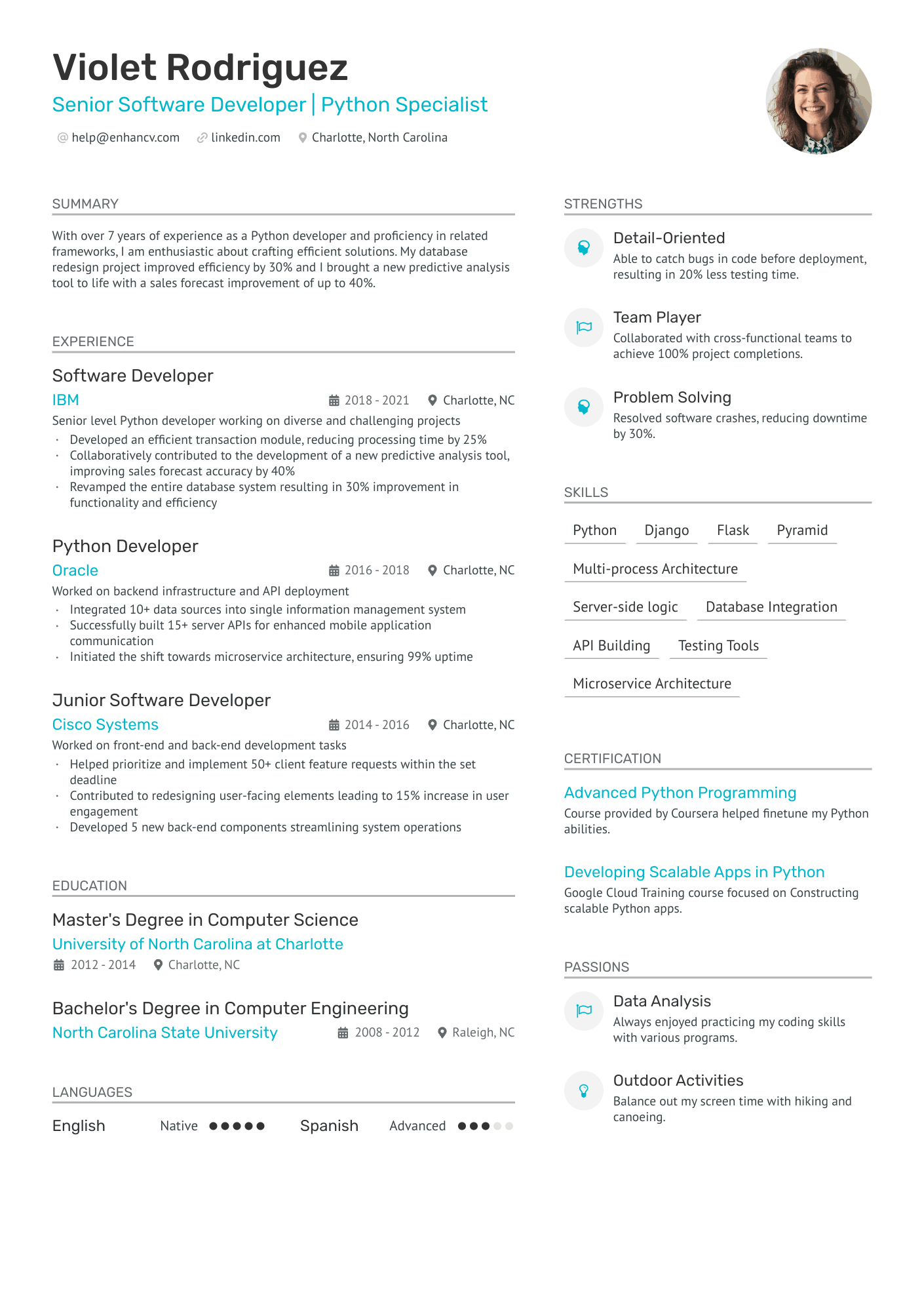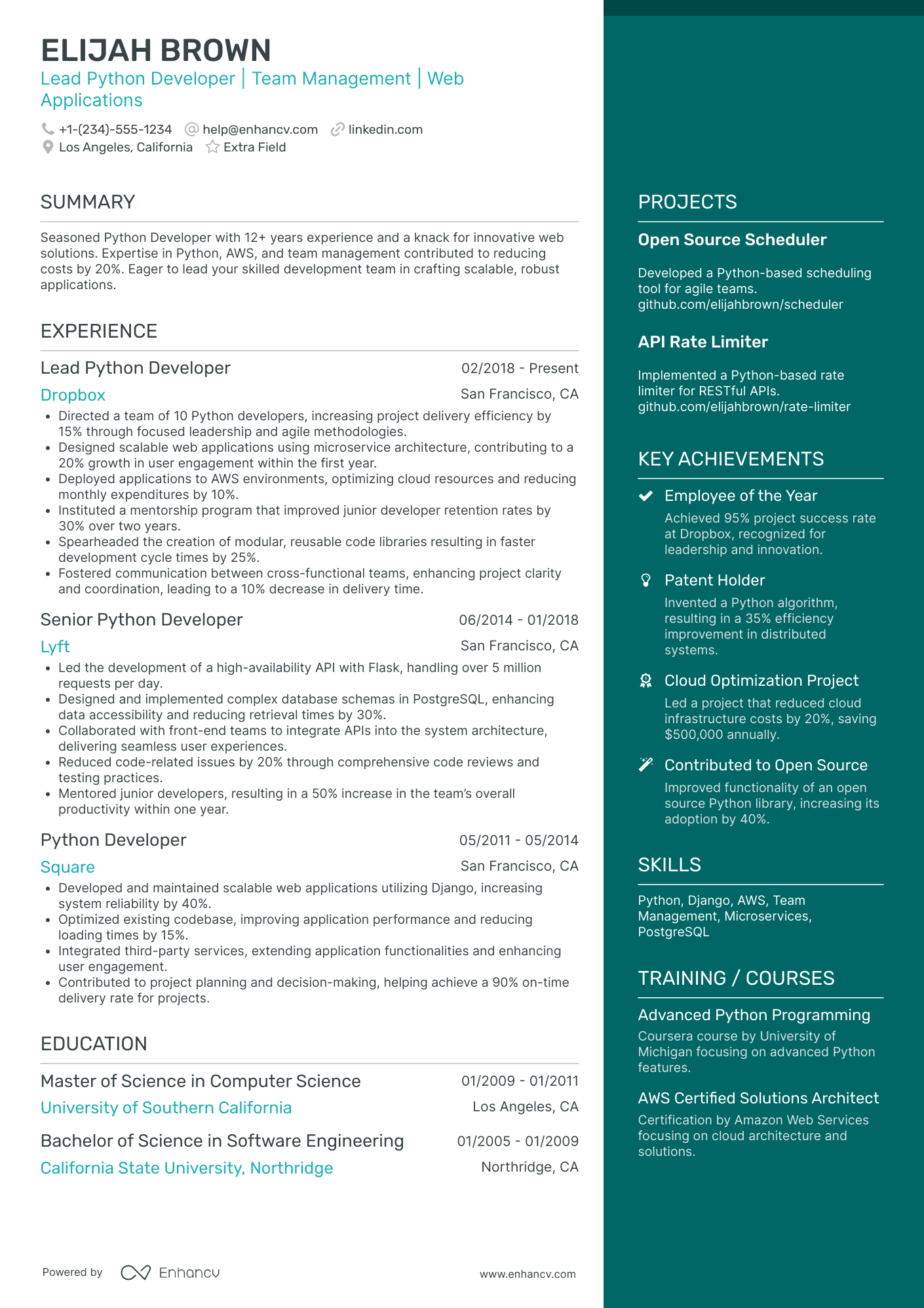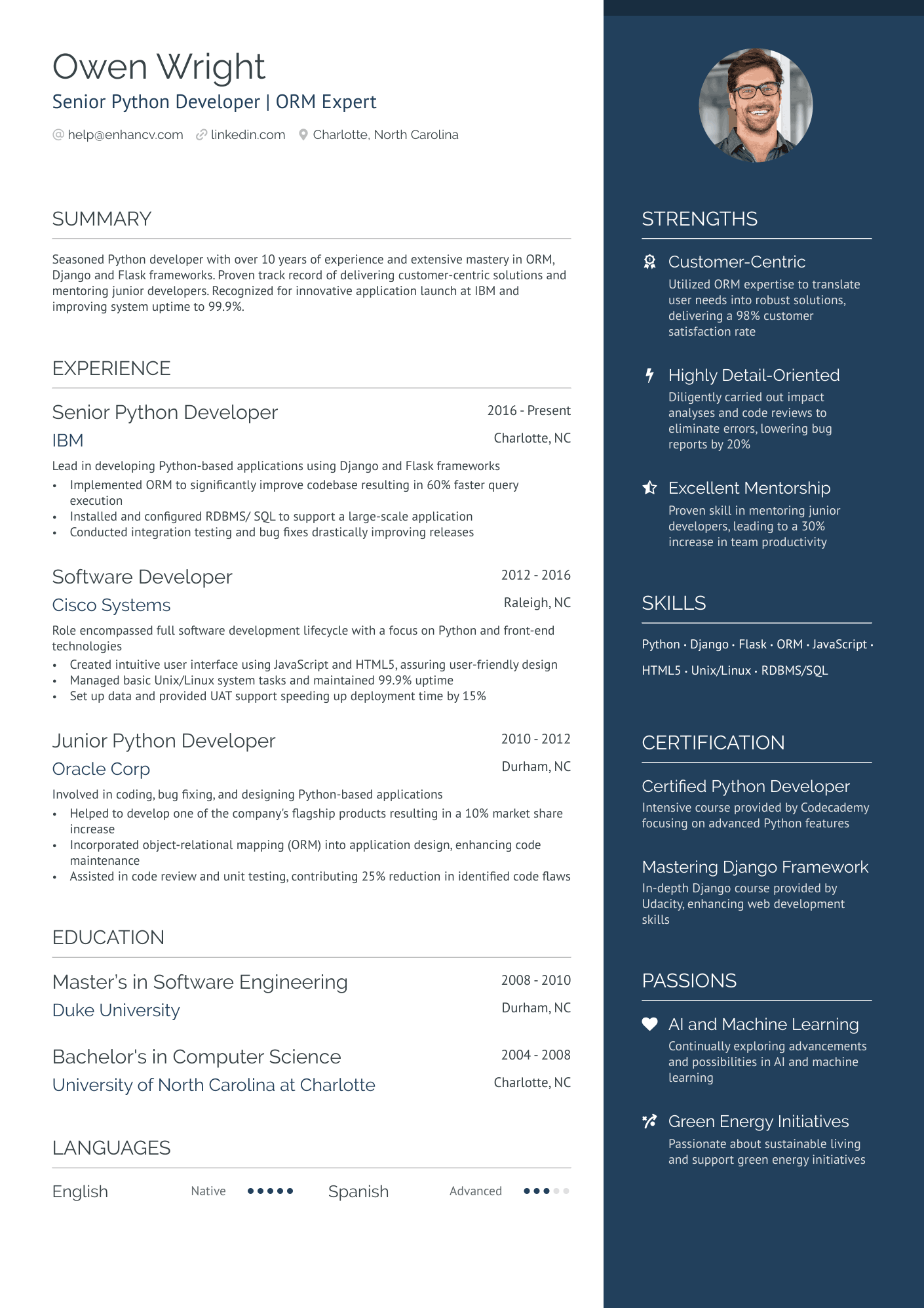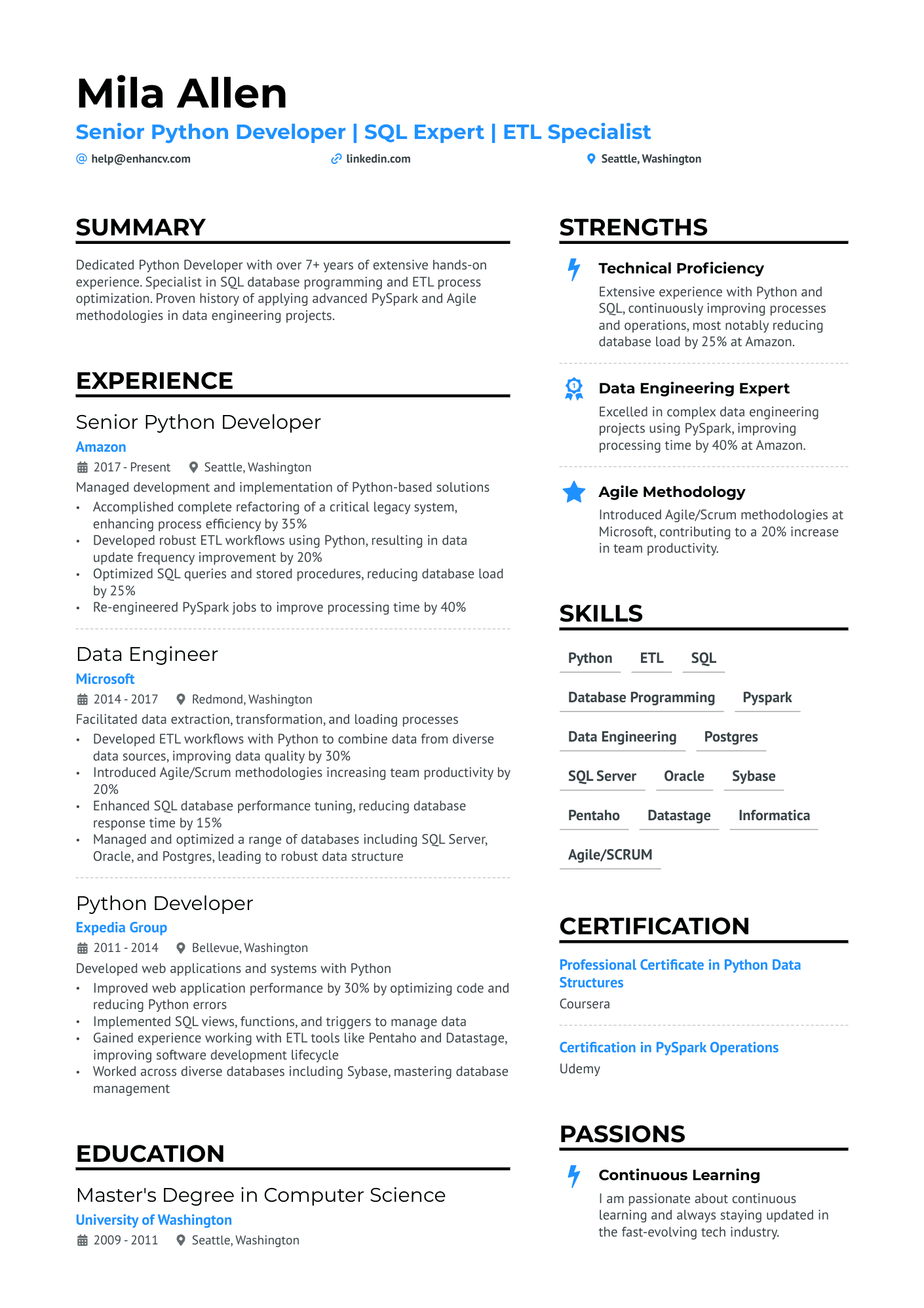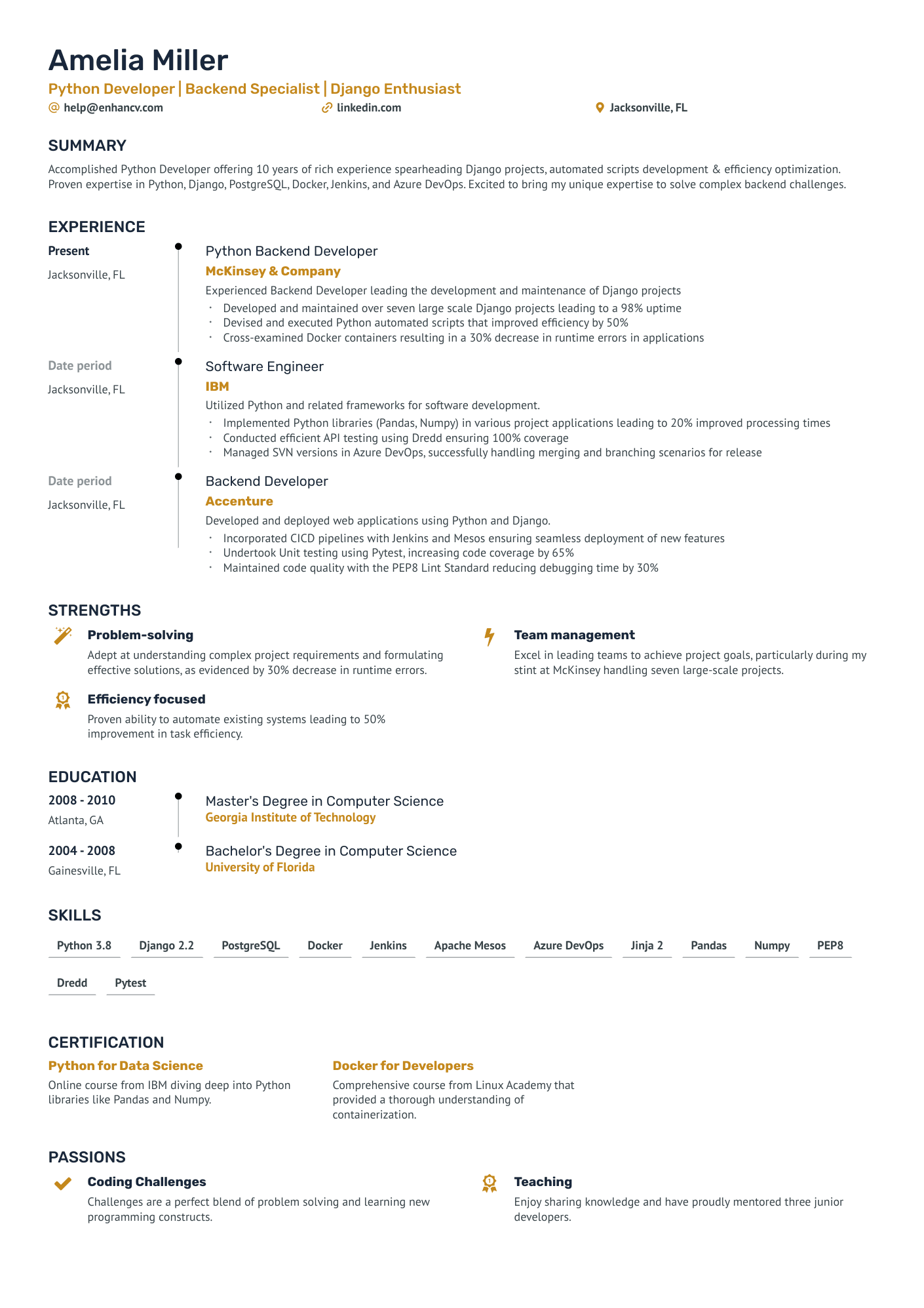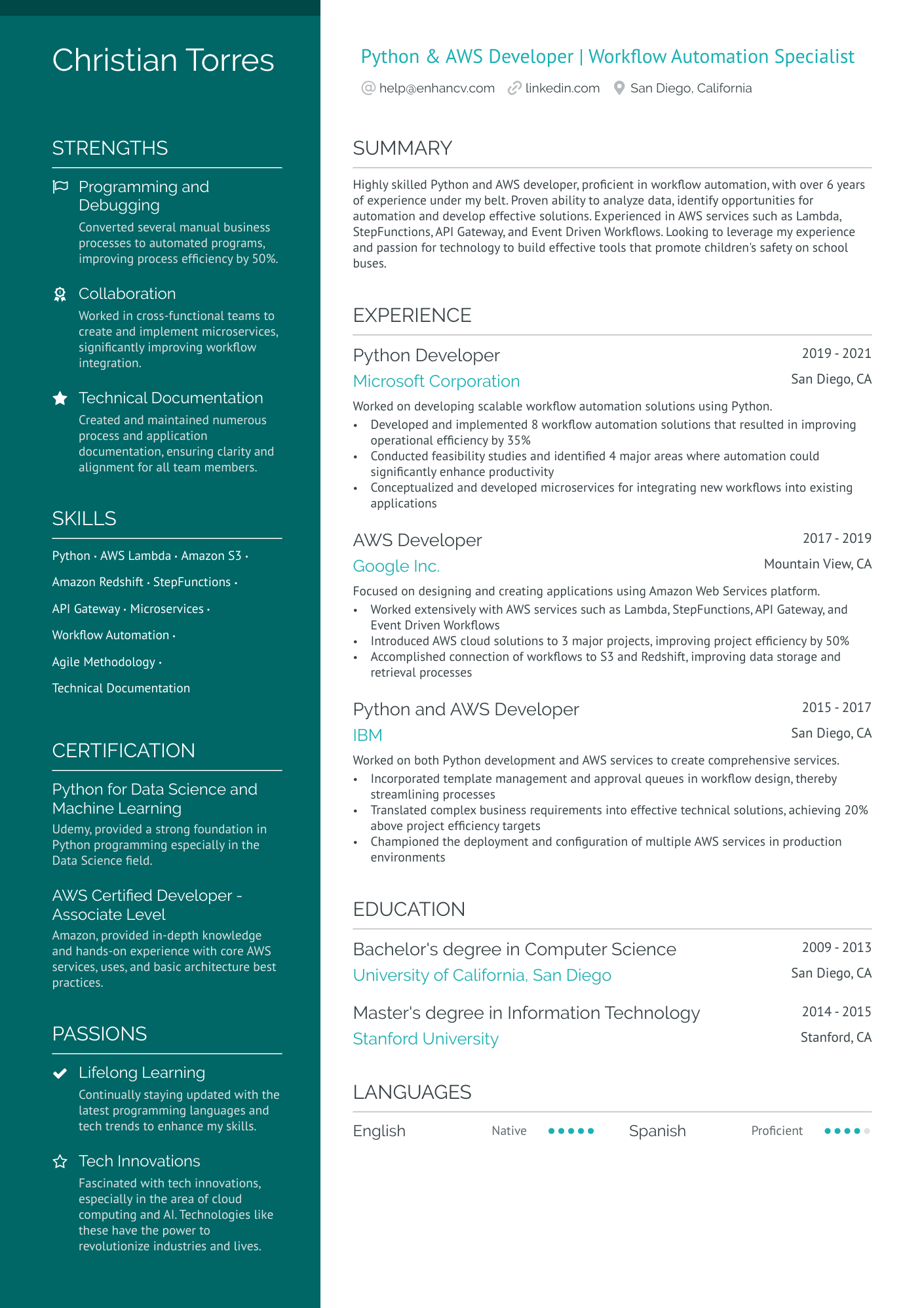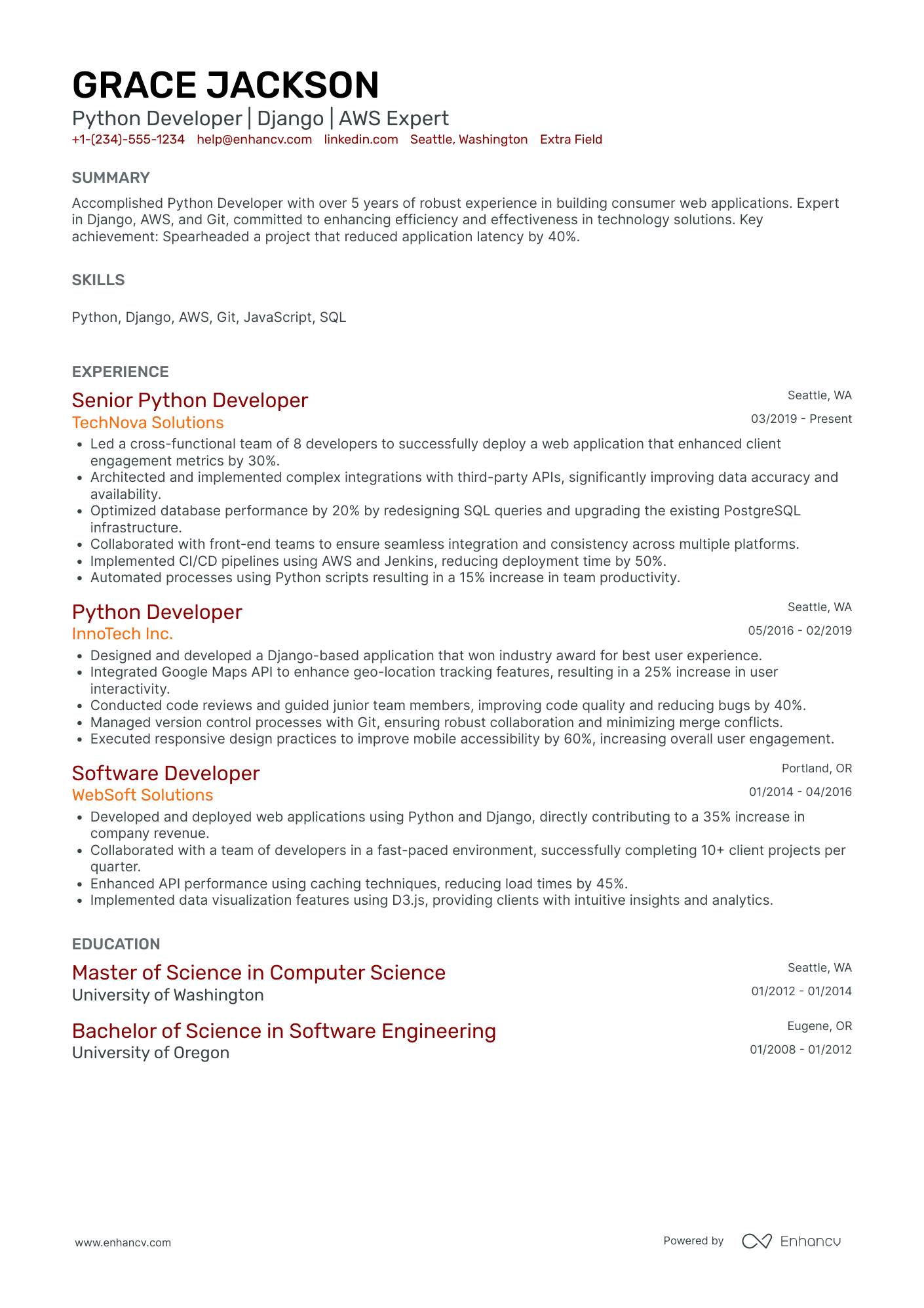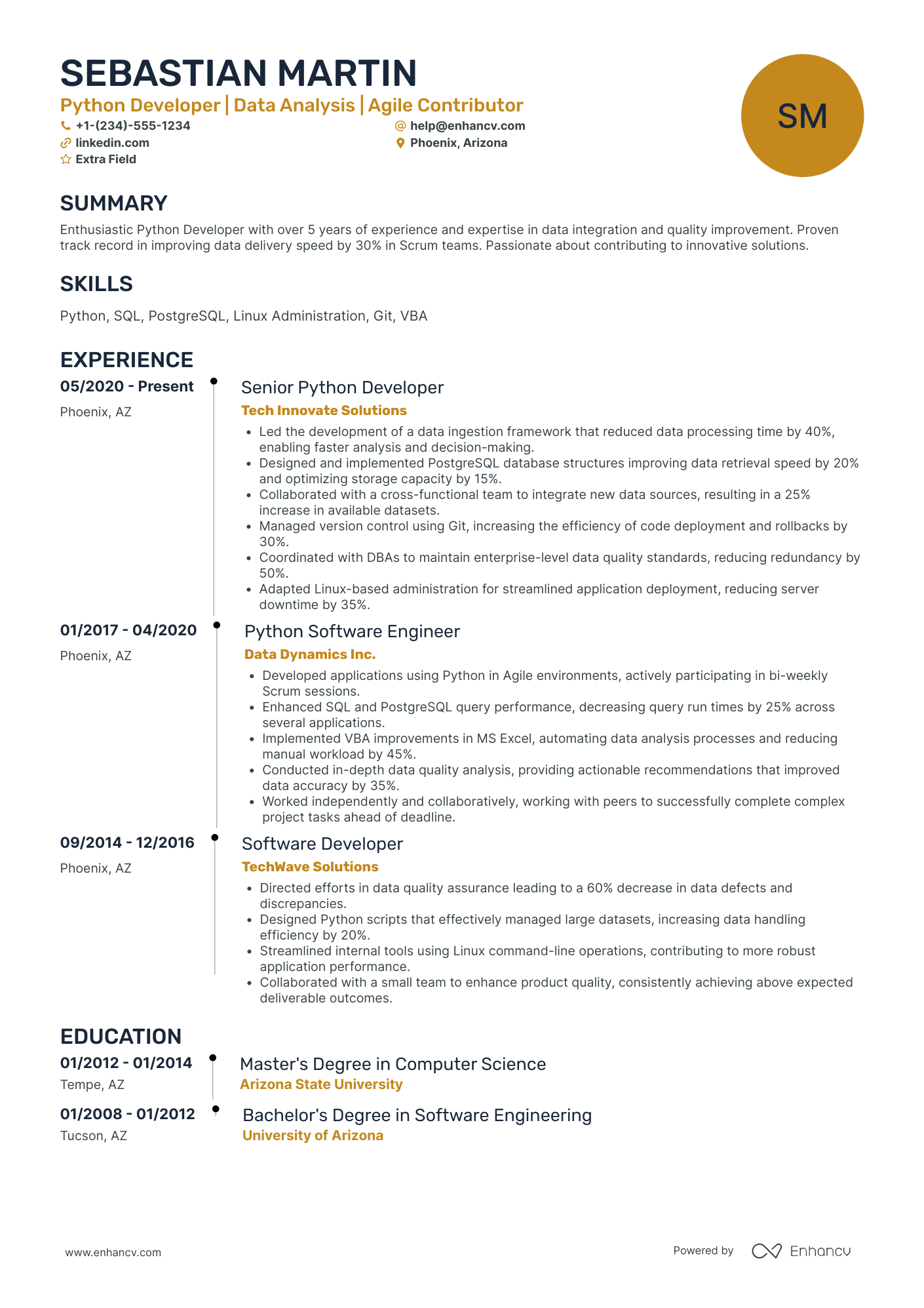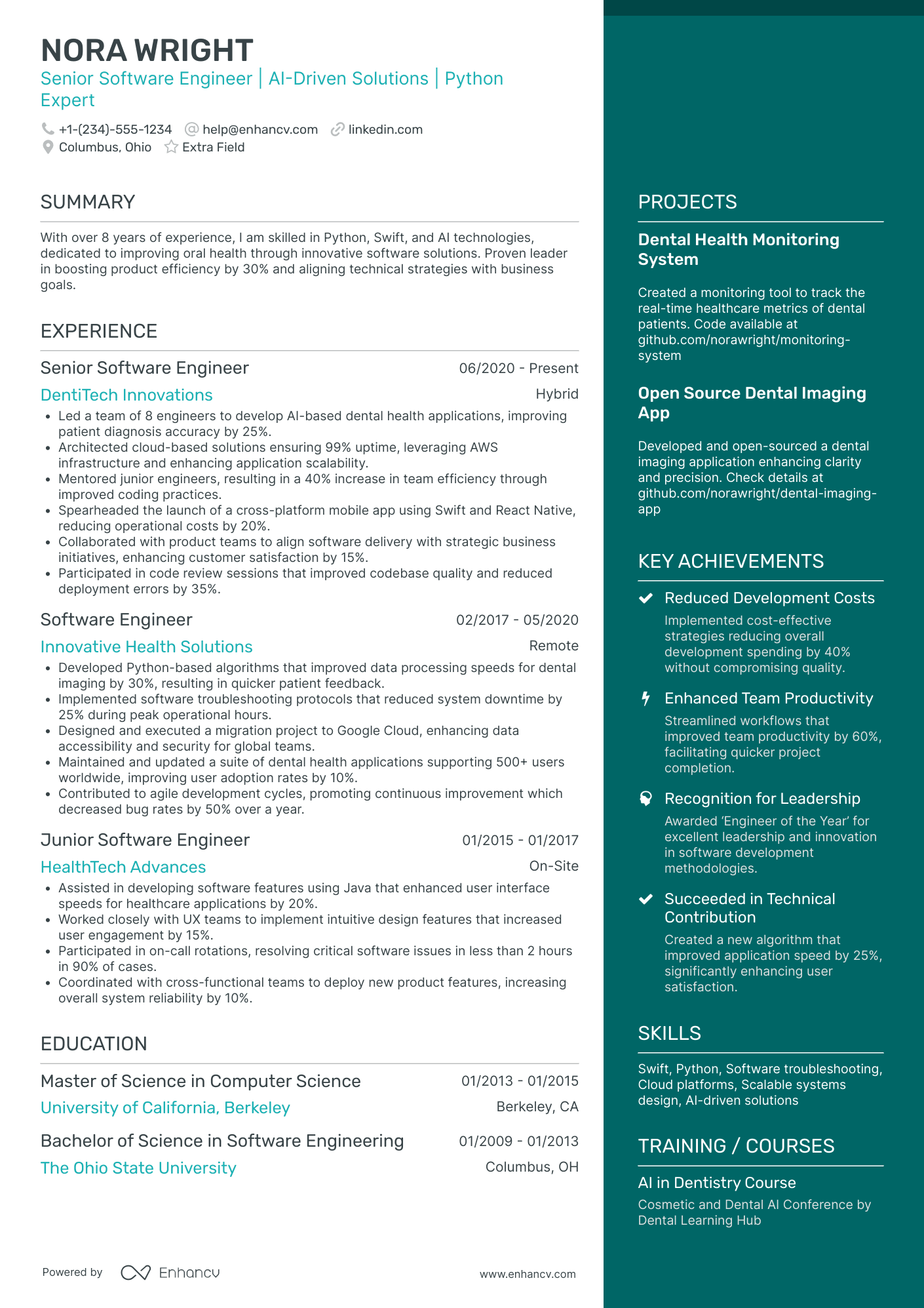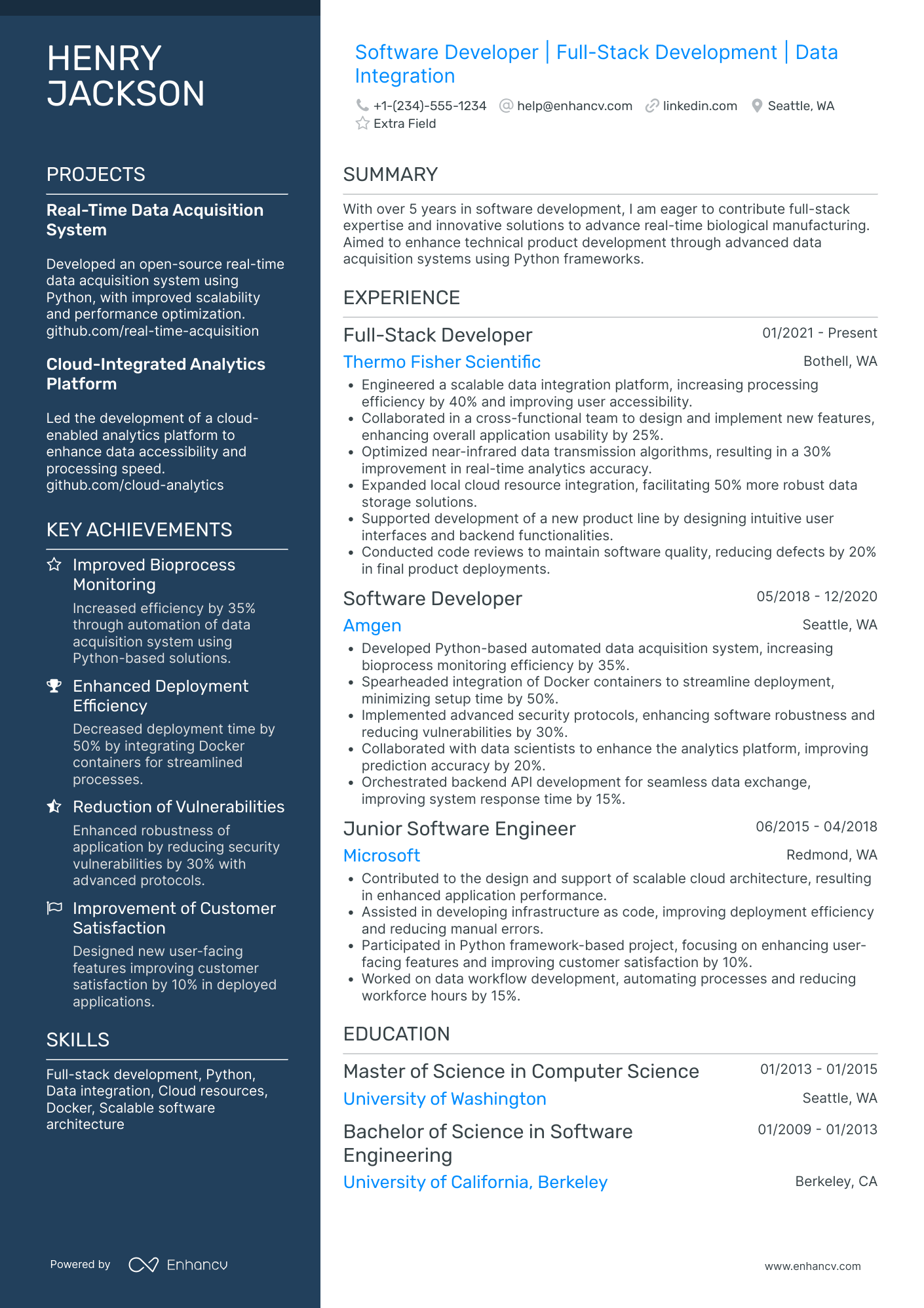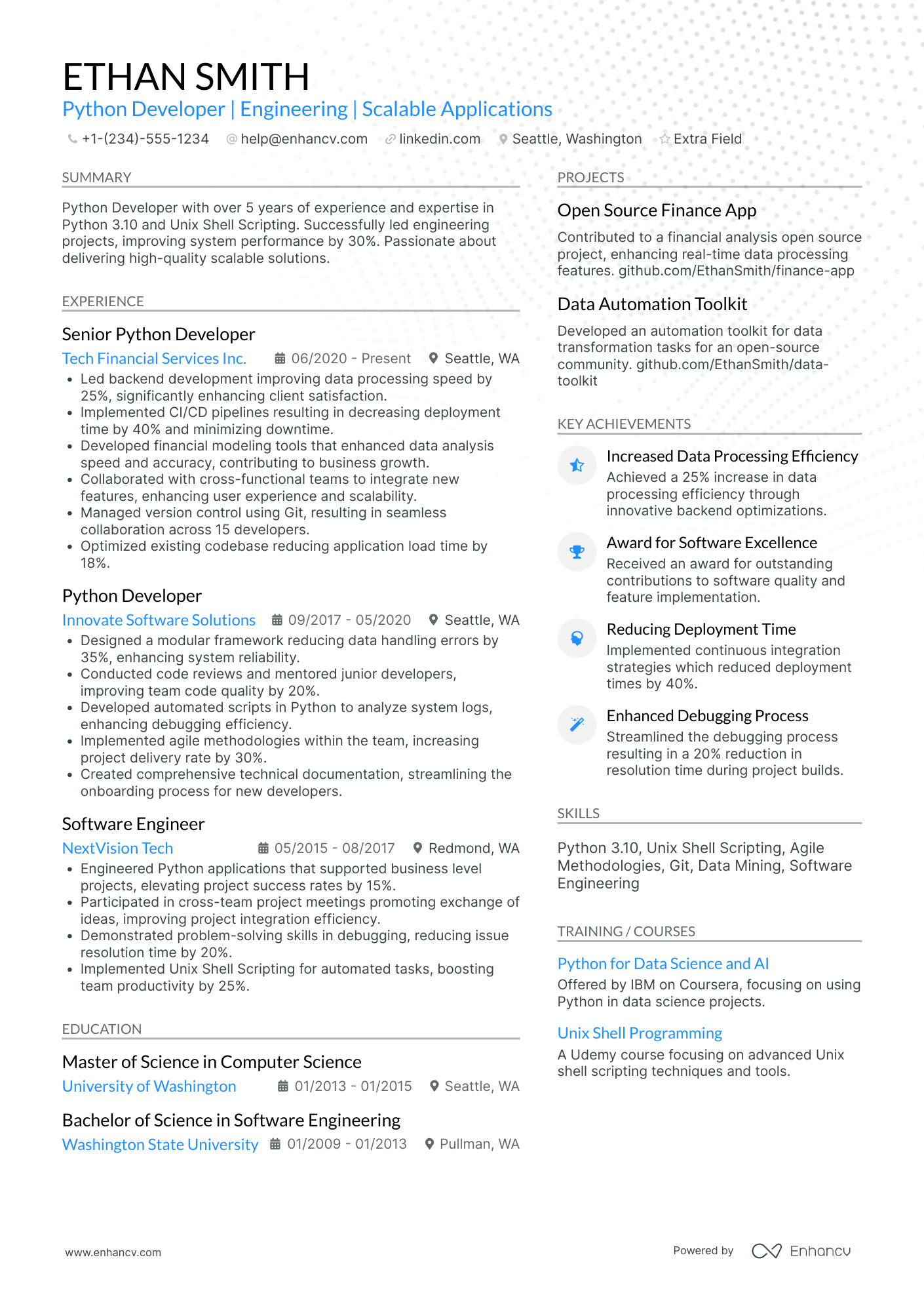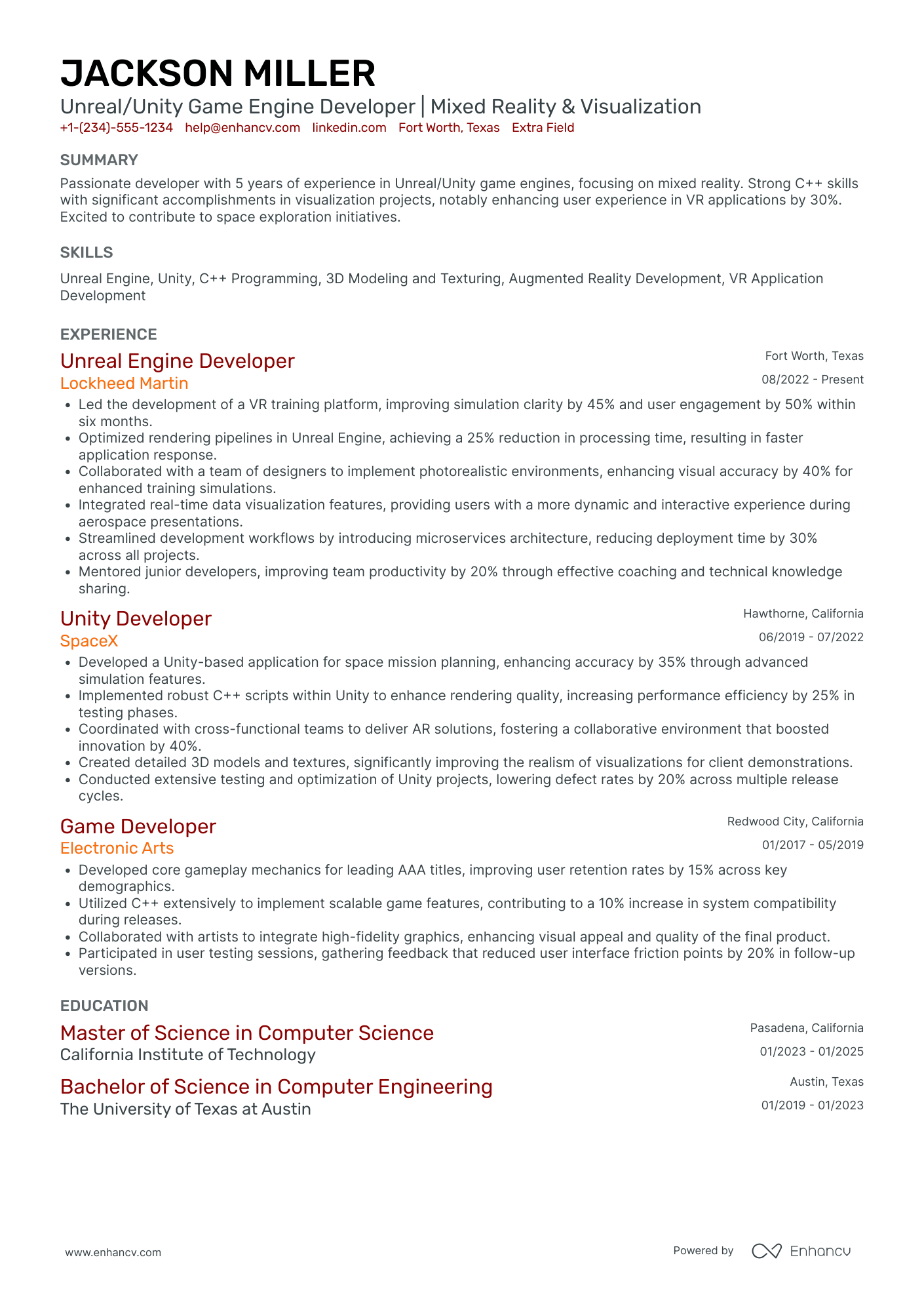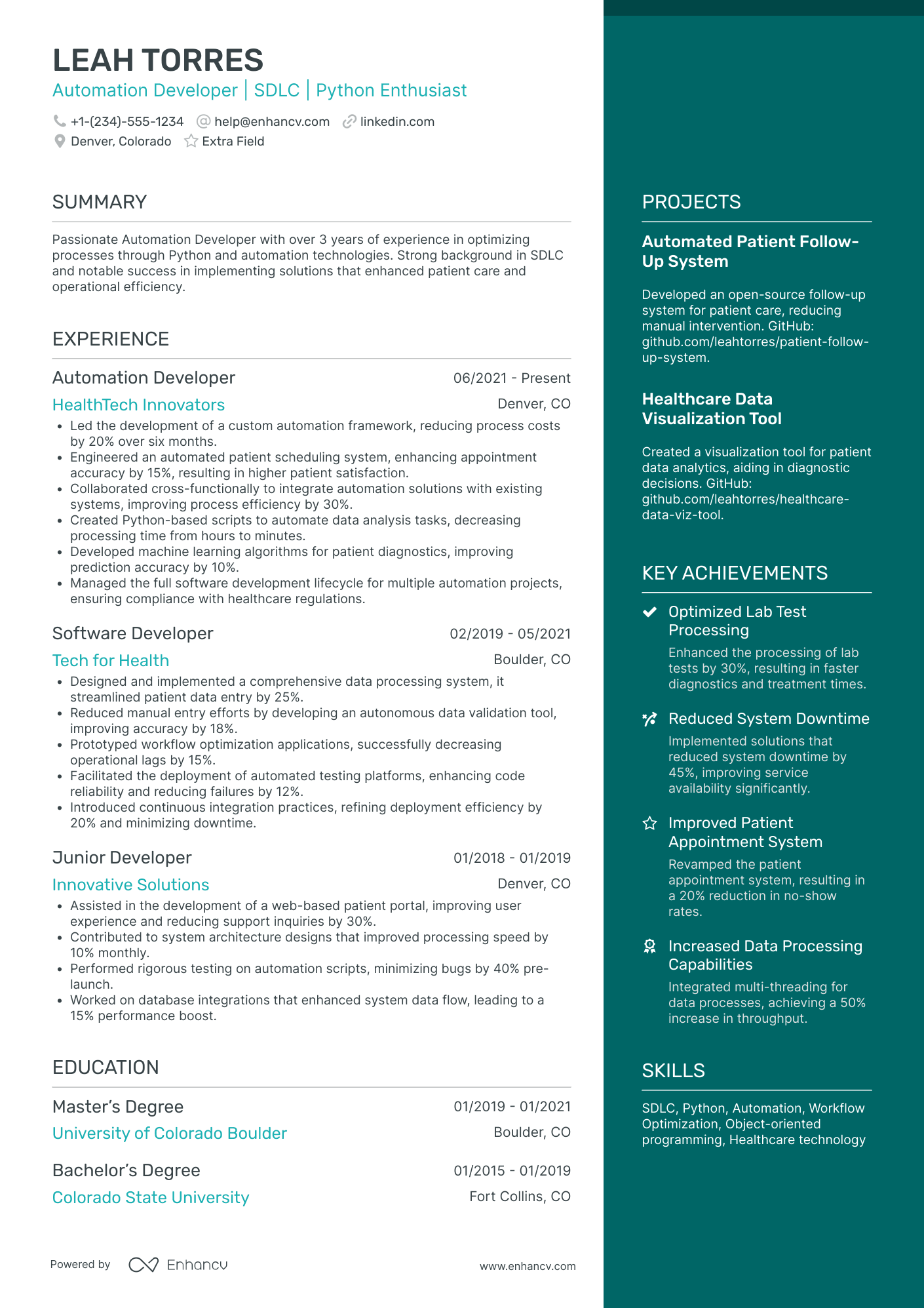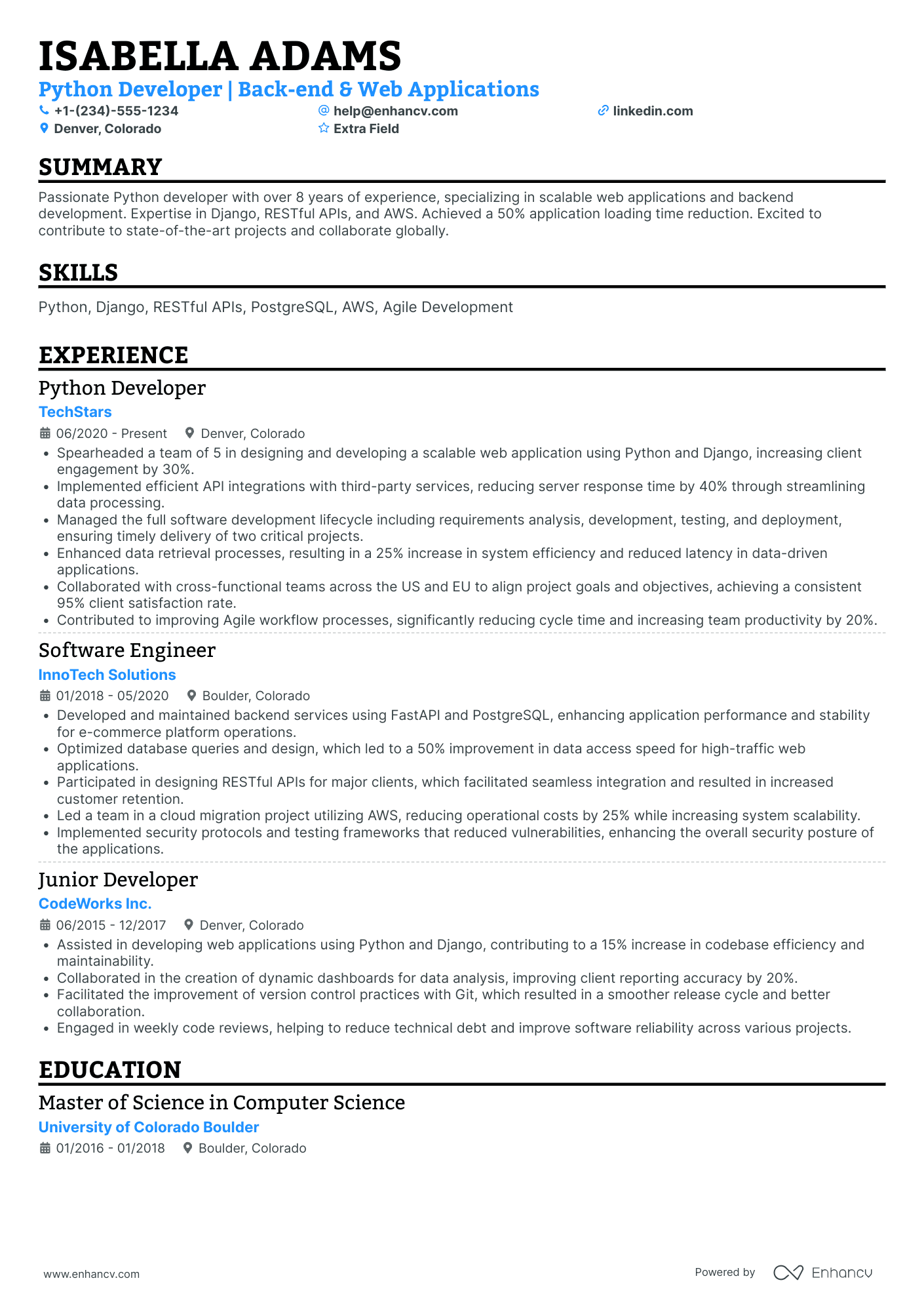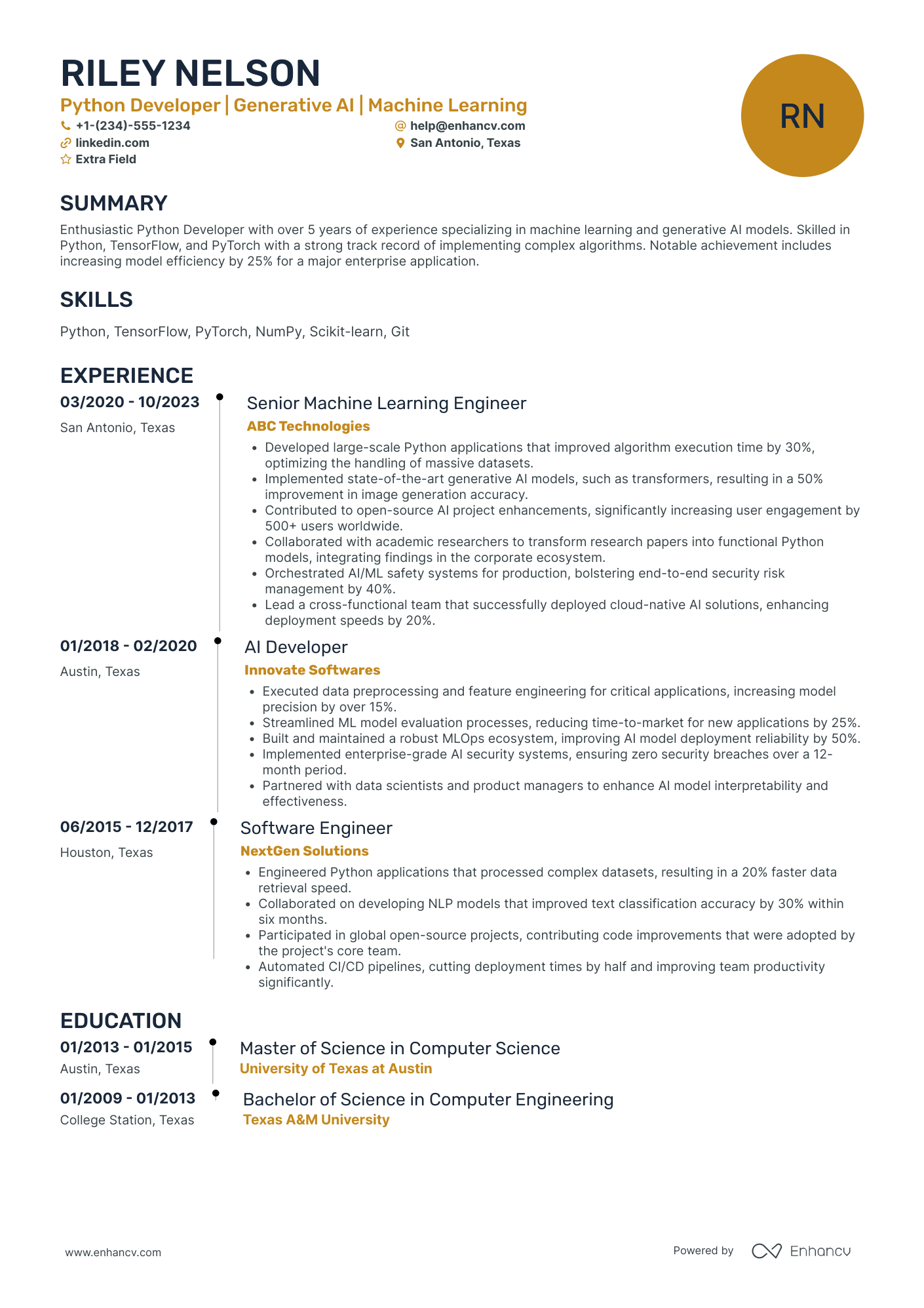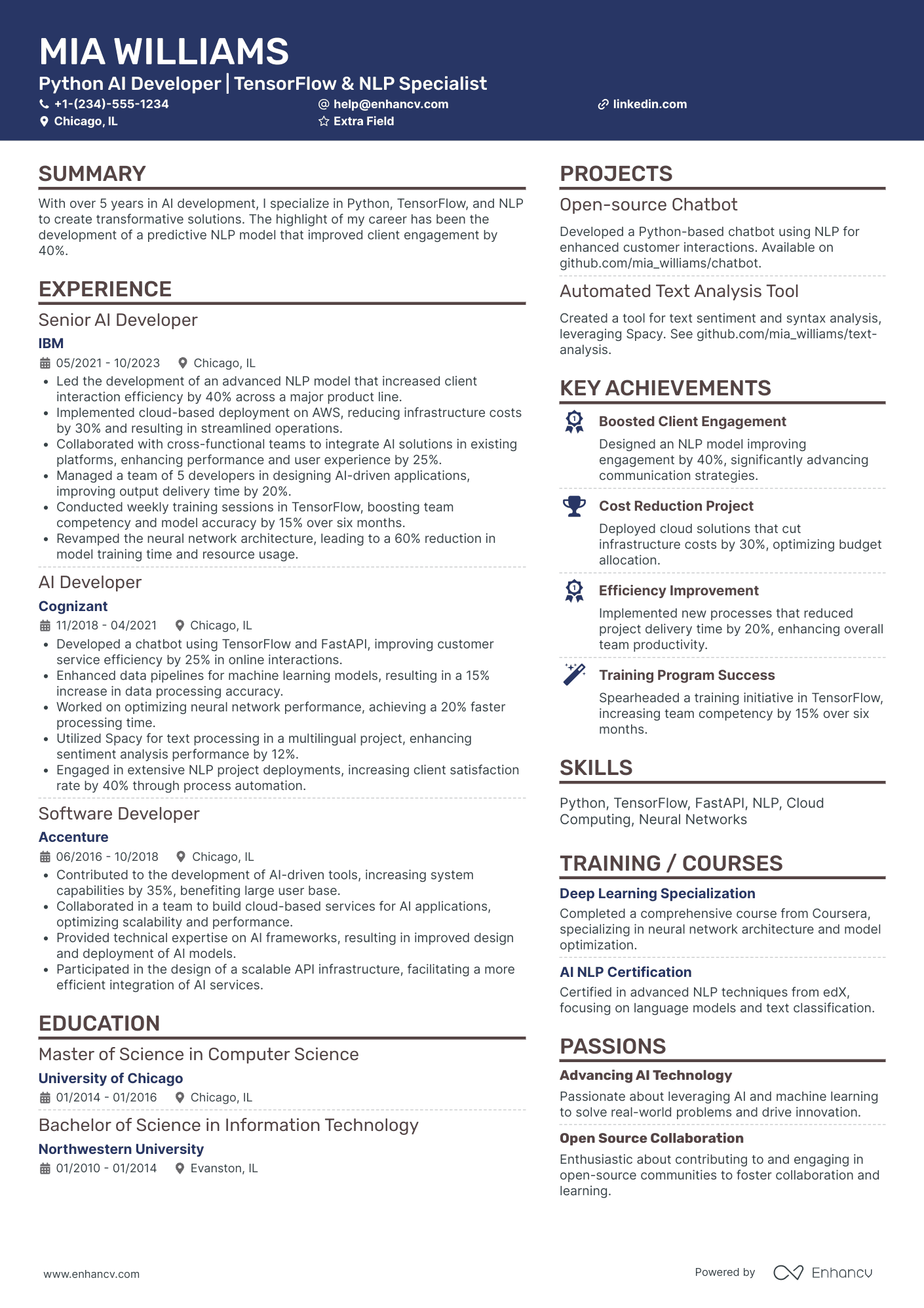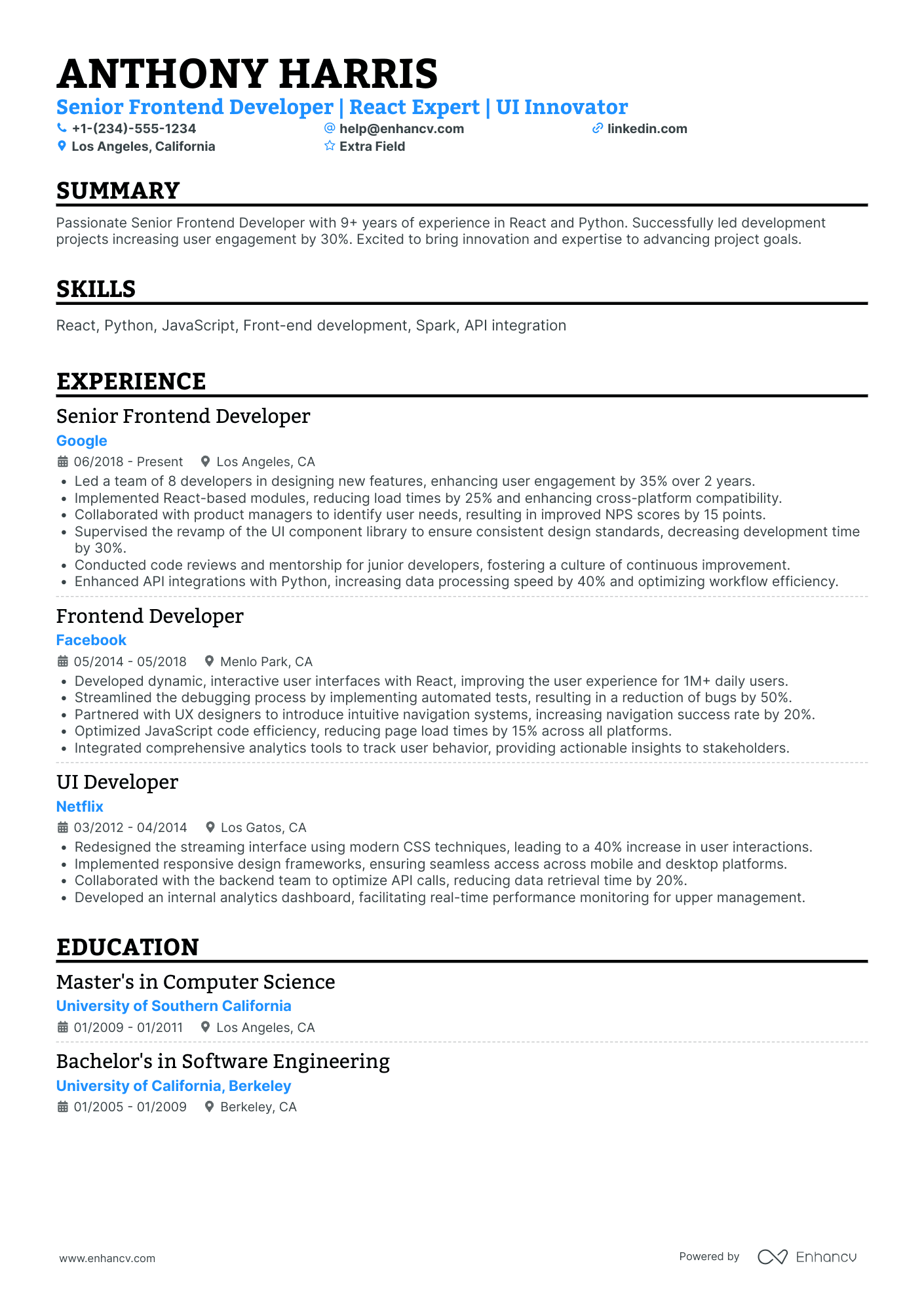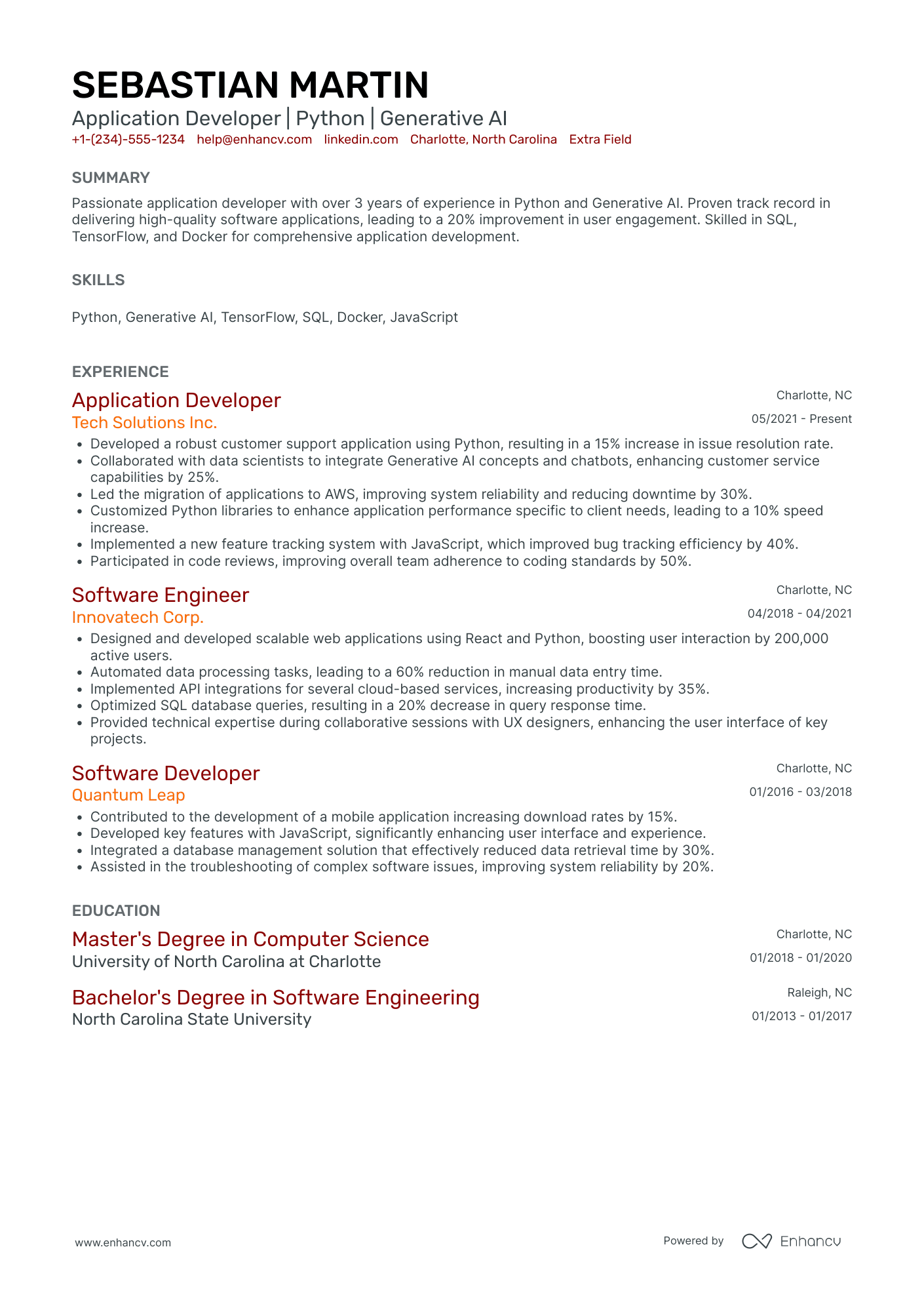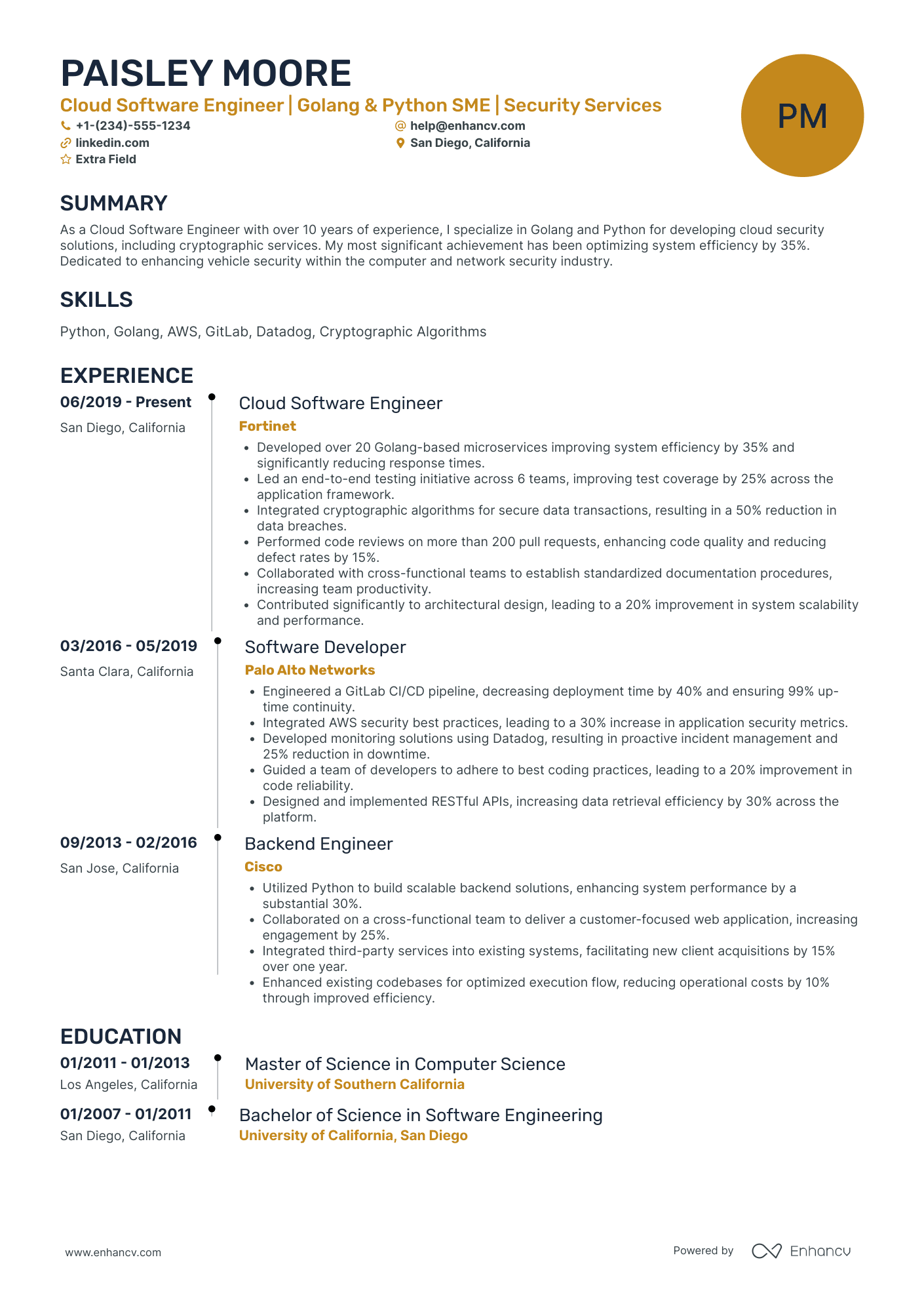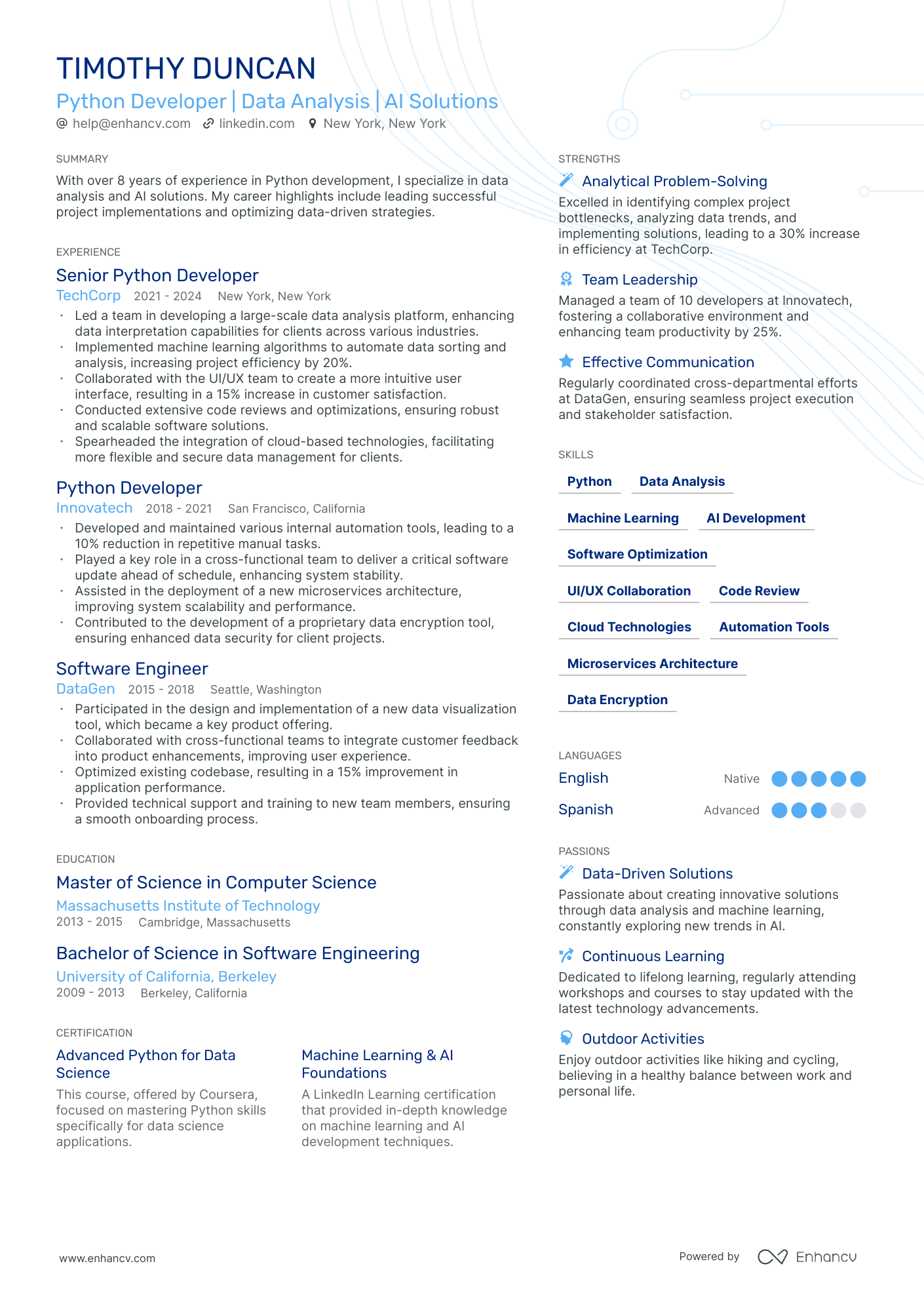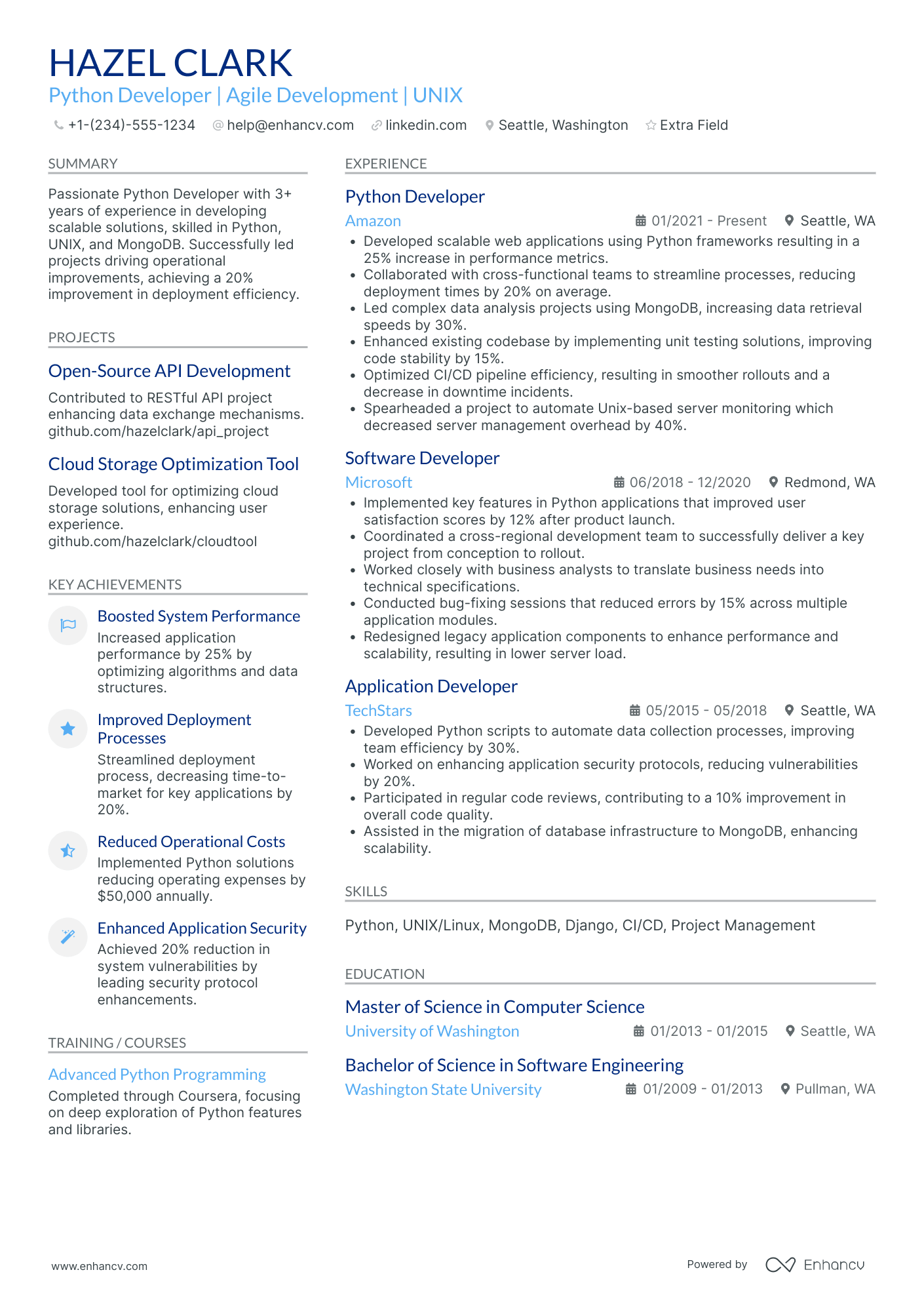Most large-scale Python-related projects are proprietary. That’s why recruiters check whether applicants honor any NDAs (non-disclosure agreements) they may have signed in their Python developer resumes.
But that’s nothing to get worked up over because we’re here to assist.
Our guide offers advice on:
- A foolproof way of describing your projects without breaching confidentiality;
- Showcasing knowledge of particular job-related Python libraries in the experience section;
- How to reference our three Python developer resume examples while writing your own;
We also have tons of other resources on specific resume sections, if you need extra help:
- Senior Developer Resume Examples
- Full Stack Developer Resume Examples
- Tableau Developer Resume Examples
- Splunk Developer Resume Examples
Python developer resume example
Here’s what this applicant does well in their resume:
- Experience Tailored to the Role: The resume skillfully highlights the candidate’s Python development expertise by drawing attention to job-relevant abilities and achievements that align closely with the role. Such as quantifiable results and concrete projects.
- Strong Educational Background: Having a solid academic foundation, such as an MSc in Computer Science from MIT and a BSc in Software Engineering from UC Berkeley, proves the applicant is prepared to tackle a heavily technical role like a Python developer.
- Relevant Certifications and Courses: Job-related certifications demonstrate a commitment to stay updated on industry developments. So, the inclusion of "Advanced Python for Data Science" and "Machine Learning & AI Foundations" show that the candidate is continuously honing their skills.
- Balance of Technical and Soft Skills: The resume presents a well-rounded skill set, listing both technical skills (like AI Development and Data Encryption) and soft skills (such as Effective Communication and Team Leadership). This balance is key in showing the applicant's versatility and ability to work in collaborative environments.
How to format a Python developer resume
You chose to become a Python developer not only because of the variety of work you can do but also the language's readable and concise syntax.
Treat your resume like a well-written Python script.
It has to have a clear message and be straight to the point. You don’t want hiring managers to lose interest after one quick glance at your resume.
Be sure to:
- Choose the reverse-chronological resume format: This one is favored by recruiters because of the logical layout of the information. But if you have no experience, opt for the functional resume format instead.
- Complete your resume header with your professional profiles: Many candidates forget to add their Kaggle or GitHub profiles. These are a great way to shine the spotlight on your work right from the get-go!
- Explain how you’ve applied your Python developer skills: Be specific about the libraries you’ve used and the results you’ve achieved, while working on data processing or machine learning projects.
- Make your resume compatible with ATS (Applicant Tracking Systems): There are many myths surrounding how ATS software works, but the truth is you have to speak the company’s language. Remember to use the same keywords used in the job description when listing your Python skills.
- Use a clean and readable font: You don’t have to stick to the overused Arial or Times New Roman. Any serif or sans-serif font would do, just make sure it doesn't overwhelm the resume.
- Pick a stylish, but not too colorful design: Similar to selecting an appropriate font, you can splash some color on your resume. But, again, make the design support your Python developer resume and don’t overdo it.
- Limit your resume to no more than 2 pages: Hiring managers have a finite review time per application as most spend only 6 seconds on any given resume. Be selective with the information you include.
- Save your Python developer resume as a PDF file: You hate it when code doesn’t parse, so don’t make the same mistake with your resume. Preserve your application as a PDF file.
Regardless of which resume template you select, there are a few crucial sections your resume can’t do without. The difference lies only in how they’re arranged. More value is attributed to the segments placed near the top of your resume.
If your experience with Python is predominantly personal projects and competition participation, move the education and skills boxes near the resume header. But if you’re a tenured professional with many large-scale projects in your work history, begin your resume by detailing your experience.
Here’s a breakdown of which sections are key to a successful Python developer resume.
Is your resume good enough?
Drop your resume here or choose a file. PDF & DOCX only. Max 2MB file size.
The top sections on a Python developer resume:
- Technical Skills: Showcase your Python-related knowledge and expertise, as well as any other relevant programming languages or technologies.
- Work Experience: Demonstrate your prior experience working as a Python developer and the types of projects or tasks you’ve completed.
- Certifications: Highlight any relevant certifications or courses taken to further enhance your Python development skills.
- Projects and Portfolio: Provide insights into the practical applications of your Python knowledge by supporting your resume with tangible examples of your work.
- Education: Though it’s not always necessary for a Python developer to have a degree in a related field, it's vital you include your formal academic training. Especially if it’s in Information Technology or Computer Science.
What recruiters want to see on your resume:
- Strong Python skills: After all, this is the minimum requirement to be considered a Python developer. The depth and breadth of your Python language knowledge determines how well you’ll perform your job.
- Experience with frameworks: Familiarity with frameworks like Django, Flask, or Pyramid is important as they’re prevalent in Python application development.
- Understanding of front-end technologies: Developers who understand front-end technologies (such as JavaScript, HTML, and CSS) can work more comprehensively on the development process.
- Knowledge of Python libraries: Libraries, such as NumPy, Pandas, and Matplotlib, are often used in Python programming for various applications, such as data analysis and visualization.
- Collaboration and communication: Python developers often work in teams and need to communicate effectively with their peers. The ability to clearly share thoughts, progress, and problems is crucial in a development setting.
How to write your Python developer resume experience
The resume experience section is where you elaborate on what you’ve achieved as a Python developer so far. For each of the work history entries you include, you reference specific results you’ve achieved.
It seems quite easy to do. But there are a few aspects you must take into account to avoid some common resume mistakes, such as:
- Listing duties and responsibilities rather than concentrating on career achievements.
- Relying on resume buzzwords to bolster your image instead of your Python developer experience.
- Including projects that are based mainly on non-related frameworks or where Python wasn’t the primary working language.
So, carefully read the job description and search for resume keywords. These usually relate to specific abilities, tools, and knowledge you must possess to be eligible.
In your case, these should include libraries, such as NumPy or Pandas, and frameworks, like Django or Flask. Then, think about concrete examples from your professional experience, where you’ve employed your skills. Link them to a particular challenge you’ve tackled and, finally, share your results.
Prioritized candidates are those who demonstrate a strong problem-solving mindset and understand that success in roles ranging from application development to database management hinges on satisfying the end user's needs.
Demonstrating efficiency in resolving user issues promptly and cost-effectively is highly valued by employers, making such candidates highly desirable for hiring.
PRO TIP
If you don’t have experience with certain libraries or frameworks mentioned in the job ad:
- Show how quickly you pick up new tools because of your solid Python foundational knowledge.
- List similar libraries you have proficiency in.
- Showcase related projects you’ve done, even if the framework was different.
To illustrate, take a look at the following Python developer resume experience section example:
- •Worked with Python, Metasploit, Scapy, and SQLMap.
- •Onboarded new clients during a networking event.
- •Assisted in the migration and merging of several large databases.
Not only is it unconvincing, but it looks sloppy:
- The default text from the template for the company description field hasn’t been removed or edited. The candidate missed the chance to include their past employer’s business niche.
- None of the bullet point entries contain quantified achievements. Plus, they don’t explain how the applicant’s accomplishments have benefited the company.
- The candidate has also relied on merely listing tools and languages they know, but not how they were used or for what projects.
Many overlook the importance of describing the business operations of their past employers, underestimating the value of such information. However, this insight is significant as it displays your broader industry knowledge, possibly proving highly relevant to the role you're applying for.
Moreover, providing context for your achievements by explaining their impact within these operations is crucial for an understanding of your capabilities and contributions.
Have a look at the Python developer experience section below:
- •Identified over 480 severe risk issues by designing and scripting 62+ attack simulations with Python, Metasploit, Scapy, and SQLMap for clients to test the security of their network architecture.
- •Onboarded 29+ new clients on common cyber risks and vulnerabilities currently threatening DMS systems and related software.
- •Assisted in the migration and merging of 7 distributed databases using Python, MongoDB and SQLAlchemy, resulting in $3.28 million saved in data storage costs.
Stating “detected risk issues” doesn’t mean much. But when the applicant mentions they’ve successfully identified nearly 500 potential risks and prevented them. Now that will grab recruiters’ attention!
How to quantify impact on your resume
Speaking of providing context. The best way to do so is to quantify your achievements by linking them to data and numbers. For each bullet point, you need to:
- Begin with a resume action verb.
- Explain the type of challenge you were trying to tackle and your method of solving it.
- Cite the results of your work.
Given the nature of the job, there are plenty of accomplishments you can reference on your Python developer resume:
- Size of databases you’ve worked on: Showcase your ability to handle and manage big data sets. This is a crucial skill for Python programmers.
- Number of projects you’ve completed: Demonstrate your experience and capability to deliver on your promises and within deadlines.
- Number of team members you’ve worked with: Show your ability to collaborate and work in a team. If you’re aiming for a Python-related software development position, this is key.
- Number of code lines you’ve written or bugging tasks you’ve successfully conducted: Emphasize your technical proficiency and attention to detail.
- Percentage of significant performance improvements your code introduced: Display your optimization skills and the positive impact they’ve had on the systems you’ve worked on.
- Frequency of software releases or updates: Boast about your work pace and ability to manage tasks.
- Scale of users impacted by your applications: Demonstrate the real-world impact of your work by emphasizing the potential business value of your work.
- Quantity of bugs or issues you resolved: Highlight your problem-solving skills and attentiveness to product quality.
How do I write a Python developer resume with no experience
If you’re just starting out as a Python developer you may have to work on a few personal side projects before you craft your resume.
Even if they’re as small as building a weather application or working with public datasets. (Kaggle has some very good options for improving your machine-learning skills, if this is your desired field.)
But if you already have a portfolio you can present to tech managers, there’s a way to list projects and events in the experience section. All you have to do is:
- Frame your projects as a part-time gig or an ongoing study activity (more on how to do this later in the guide).
- Mention workshops or competitions you’ve participated in. Better yet if you’ve won prizes or recognition for your work during the events.
- Reference any leaderboards you’re part of. Especially if you’re aiming for a Python-related network and cybersecurity position.
The best part about the last option is that even if you don’t have work experience, leaderboard stats can carry the same weight.
The reason for this is that companies are actively searching for cybersecurity specialists to find bugs or issues with their products. For each bug identified and reported to the business, there’s an official confirmation by that particular company in the form of a bug bounty.
So you don’t necessarily need to have worked for a company to have its stamp of approval that your Python skills are up to par.
How to list your hard skills and soft skills on your resume
Next on the agenda is the talent section — a small box on your resume where you detail your most relevant technical and social abilities.
Naturally, one side must not overwhelm the other.
It’s tempting to dump all your Python developer hard skills in one place. These include your knowledge of libraries, frameworks, and platforms.
But you’re not a robot. And you shouldn’t strive to be one.
Display some of your personality by mentioning your strongest soft skills. These represent your ability to integrate well into the company’s culture and your team.
They can also prove your efficiency as a Python developer by highlighting your time management or organizational abilities.
But irrespective of the type of talent you add to your skills section, make a point of the results your abilities have brought about:
- Introduce your achievement with an action verb.
- Detail the issue you were trying to resolve.
- Describe how your skills have positively affected the outcome of the situation.
If the ad isn’t very detailed about the talents the job demands, here are some ideas for hard and soft skills you can insert in this section:
Best hard skills for your Python developer resume
- Python Programming
- Django framework
- Flask framework
- Python SciPy
- Pandas
- Jupyter
- NumPy
- Opencv
- SQLAlchemy
- Matplotlib
- Data Analysis
- Machine Learning
- Deep Learning
- Artificial Intelligence
- PyTorch
- Tensorflow
- Keras
- Web Scraping
- API creation
- SQL and NoSQL databases
Best soft skills for your Python developer resume
- Problem-solving
- Team collaboration
- Communication
- Adaptability
- Creativity
- Time management
- Decision making
- Project management
- Attention to detail
- Self-motivation
- Critical thinking
- Patience
- Debugging skills
- Understanding of user experience
- Ability to work under pressure
- Continuous learning mindset
- Leadership
- Empathy
- Flexibility
- Innovation
How to list your certifications and education on your resume
Since Python can be implemented in a variety of projects, education requirements can fluctuate, too.
Most companies will mention whether they need a candidate with a solid background in Computer Science, or if someone with a basic understanding of Python and other related technology would suffice.
No matter the level and type of your qualifications, there are a few essential rules you must follow when framing your education section:
- If you only have a Bachelor’s degree, consider adding role-related certifications to supplement your section.
- Include your Bachelor’s degree, even if it’s not IT-related. If it is, provide more information about your academic activities and projects.
- Don’t list your high school diploma, unless you’re fresh out of college.
Let’s look at the first scenario - you’re a tenured professional and you have an extensive academic background. In this case, you don’t have to list too many details about your education. Simply:
- State the name of your degree and your university (college).
- Provide the start and end date of your training.
- Mention one or two of your top academic achievements.
By contrast, if you must be more elaborate:
- Include relevant majors and minors.
- Mention your GPA, if it’s above 3.5.
- Highlight pertinent coursework, especially if it addresses data management or machine learning issues.
Here’s what your education section should look like:
- •Completed the Network Security Concentration, which focuses on analyzing, designing, and safeguarding computer-based systems.
Fortunately, you don’t need to be so detailed when listing your certifications. All you have to do is:
- State what qualifications you received.
- Name the issuing institution.
- If it expires, mention the validity date.
Best certifications for your Python developer resume
How to write your Python developer resume summary or objective
One more section to be mindful of is the resume profile.
This is a brief personal statement near the resume header, which provides a summary of your professional expertise and accomplishments.
The trick is to pick the right summary format for your resume. Depending on how much prior experience you have as a Python developer, you have two options:
The first one is best used by tenured specialists with at least 5 years of related experience. The main focus of the summary should be on:
- Your proudest career accomplishments
- Notable past employers
- Your top tech skills
Alternatively, if you’re a novice Python developer, the resume objective is a better option for you. While it’s similar to the summary, it concentrates mainly on:
- How your current qualifications can benefit the company.
- How many of your tech talents align with the available position.
- Relevant internships and side projects you’ve completed.
Check out the following resume objective sample:
The one small positive in this example is that the candidate directly appeals to the potential employer.
However:
- There’s no mention of actual success stories to prove that the applicant hasn’t wasted their time during those two years.
- The candidate has fallen into the “laundry list” trap, i.e. recounting job responsibilities rather than achievements.
- Also, the resume states that the applicant is a Computer Science graduate. Yet, there’s no acknowledgment of their specific tech skills.
Being a Python developer novice doesn’t mean there’s nothing to brag about. You may have only one pertinent career accomplishment. Don’t wait for recruiters to find it somewhere near the bottom of your resume.
Here’s how you can include it:
There’s no need to provide every little detail about the project. However, you should:
- Refer to particular achievements and the tools they’ve used to complete their tasks
- Share information about other instruments in their toolkit.
The candidate successfully hints at their overall level of Python proficiency.
Now, review the following Python developer resume summary sample:
You can see that being an experienced professional doesn’t equal being able to describe your expertise properly.
This candidate has failed to:
- Showcase enough of their technical background and social skills to be considered a tenured specialist.
- List any career-related achievements to make themselves stand out. Hiring managers want applicants who strive to progress within their field.
- Explain their connection with IBM and Google. Name-dropping alone won’t help them get hired.
- Include the proper names of their certifications. These matter, as each training program is different. Sometimes recruiters and companies prefer one type of qualification over another.
We helped this candidate amend their resume summary:
Now hiring managers know that the applicant:
- Can manage large-scale projects with multiple databases.
- Has a solid experience in the transport, warehousing, and consumer goods industries.
- Can work cross-functionally and organize projects across several time zones.
- Can work under stress and be relied on by their team during peak shopping seasons.
Optimize your resume summary and objective for ATS
Drop your resume here or choose a file.
PDF & DOCX only. Max 2MB file size.
Additional sections for a Python developer resume
Apart from the must-have sections on your resume, you can create extra segments to highlight other aspects of your expertise. The ones that don’t really fit into any of the other categories.
Depending on the position you’ve chosen and the specific demands that come with it, there’s a variety of other sections you can add. For example:
- A security clearance, if you’re aiming at a government intelligence role or a stint in cybersecurity.
- Personal projects, presentations, research, guides, and white papers.
- Professional association memberships, open-source communities, role-related organizations, and hacker groups.
- Prizes, awards, and recognitions.
Some of these may overlap and can be framed as an activity or project segment on your resume. So, it’s crucial you know how to describe your work and make the right impression.
How to put a personal projects section on a resume
Regardless of the role’s level, most tech managers would want to see you in action.
They must determine whether your approach to work and way of writing code fits with what their team is currently working on.
So, to have your project well-presented:
- State the name of your project and the place where you conducted your work.
- Briefly describe what your project was about and the type of problem it was designed to solve.
- Provide the date range of your involvement with the project.
- Emphasize one top insight or benefit that resulted from your work.
- Include a link to an online version of your project, if applicable.
The final appearance of the activity section should resemble the one below:
- •Helped over 50 students find their perfect job placement after college by presenting them with scraper results relevant to their degree or field of interest.
Key takeaways
Let’s recap the essentials:
- Choose the reverse-chronological resume format to best outline your career progression.
- Include your Kaggle or GitHub profile in the resume header.
- Pick either a resume summary or objective to appeal to employers the right way.
- Always provide the necessary context when quantifying your accomplishments.
- Balance out your skills section with both technical and social talents.
- Make sure to include your highest level of academic achievements when filling out the education section.
- Check the date of validity before you add any role-relevant certificates.
- Don’t forget to showcase your Python projects, if you have the real estate to do so.
It definitely takes some effort to present your projects in a way that aligns with the available position—but it'll all be worth it in the end.
Python Developer resume examples
By Experience
By Role
